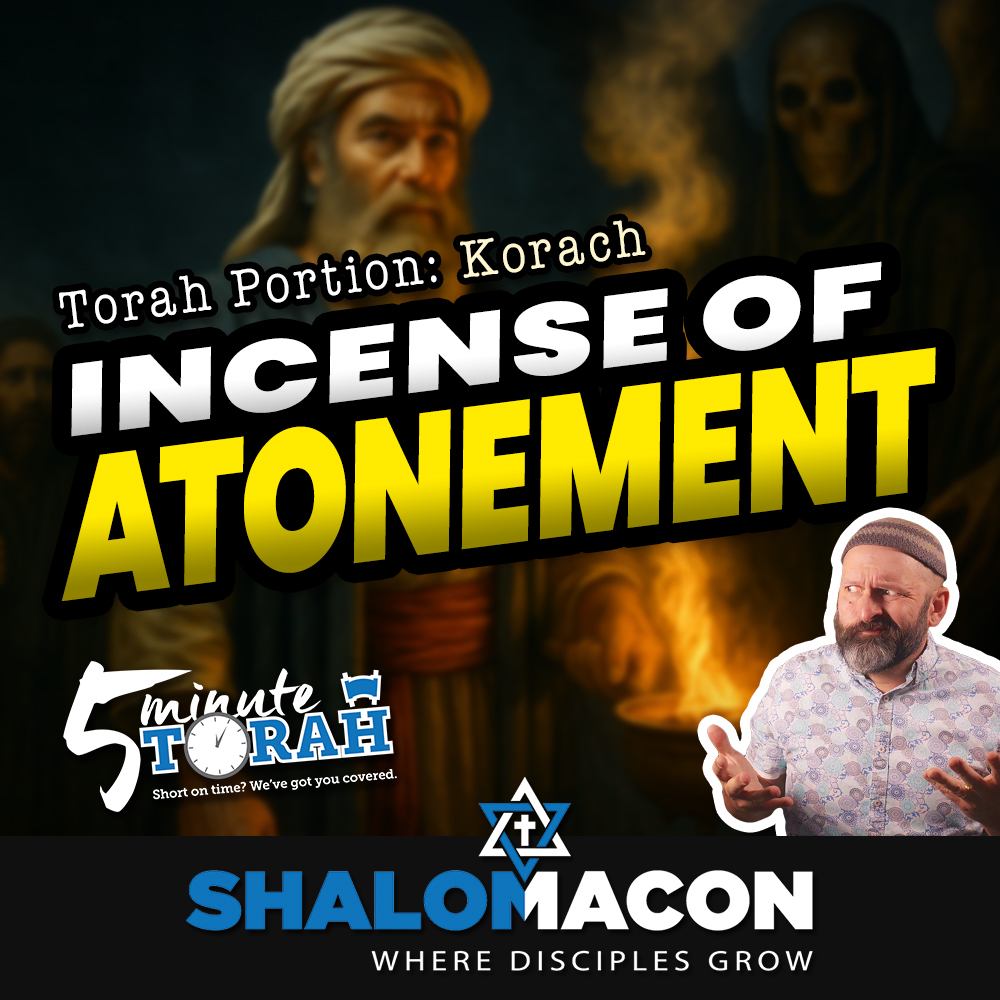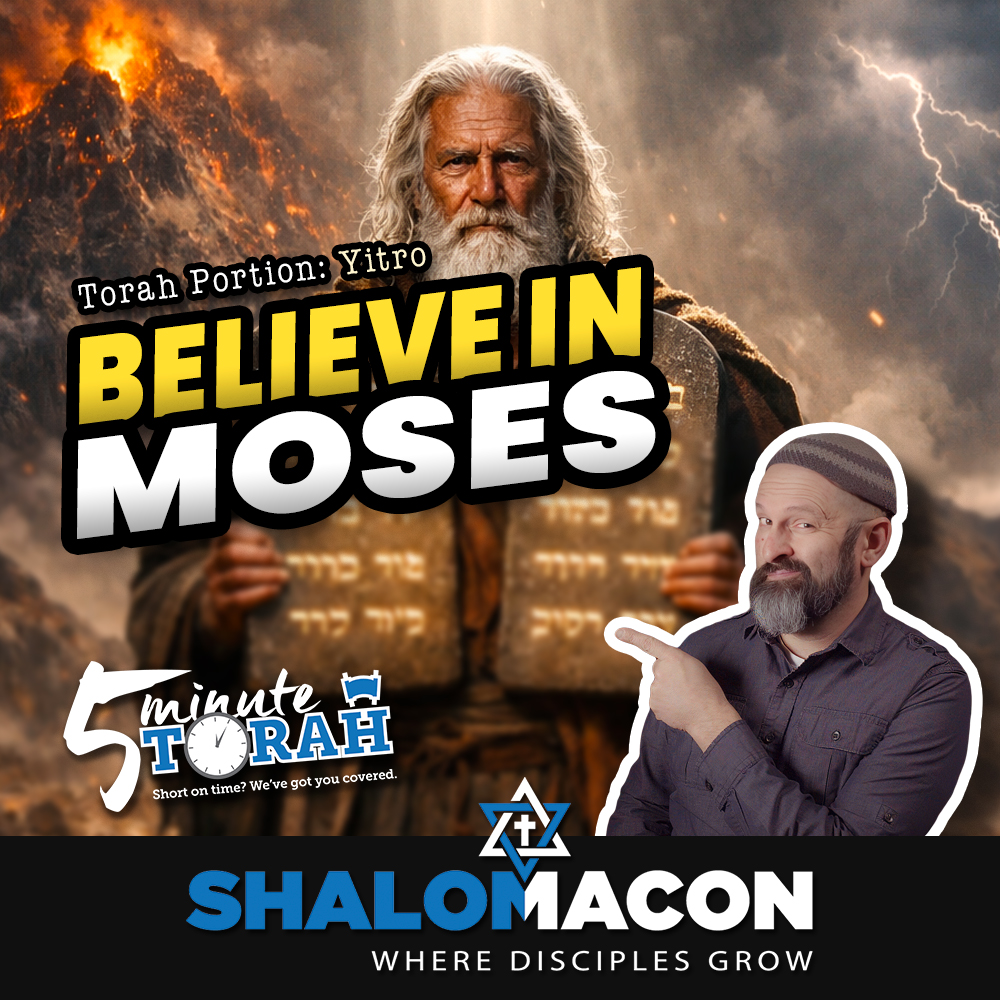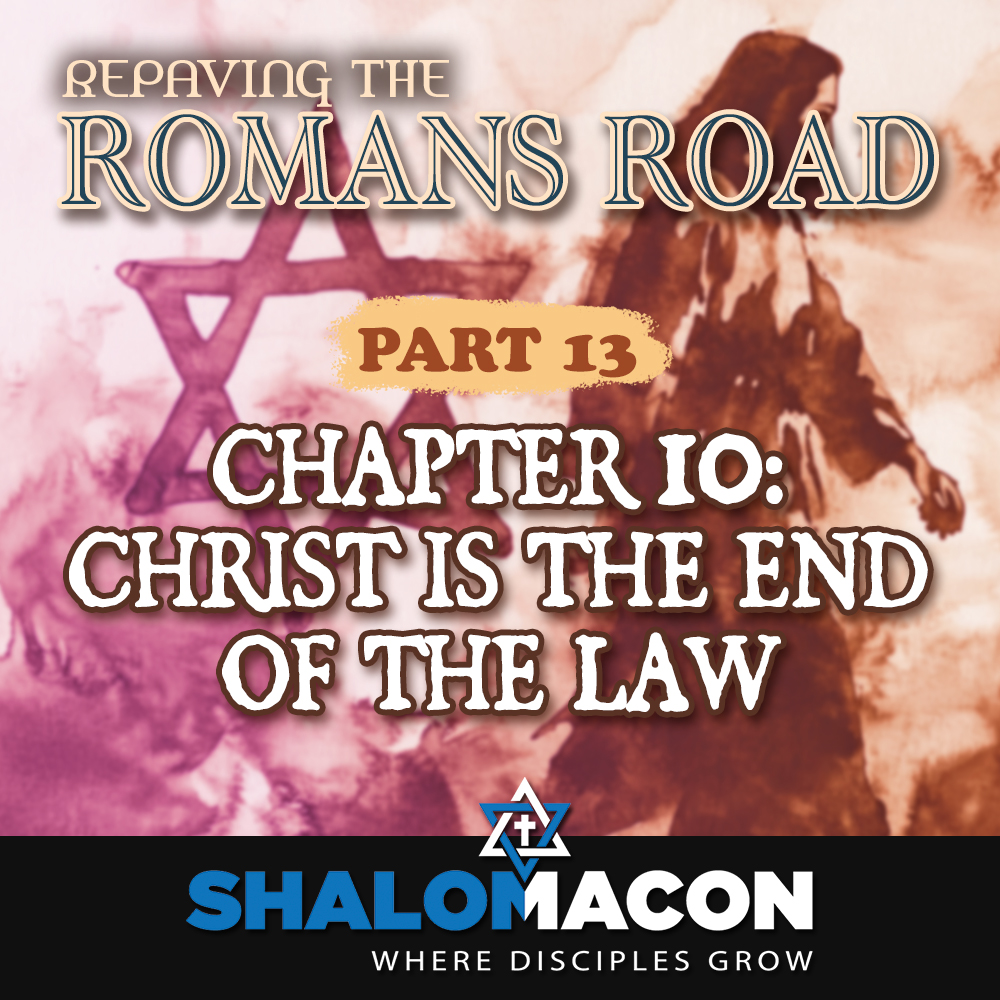Episode Transcript
[00:00:00] Have you ever had your character attacked? How did you respond? Did you fight back by trying to destroy the character of the other person or did you turn the other cheek? What lesson can we learn from Moses and Aaron about handling attacks on our character? Let's find out in this week's five Minute Torah Shalom and Blessings from Shalom Macon, the place where disciples of Yeshua learn, connect and grow. I'm Darren and before we get into the five minutes of my five Minute Torah commentary, let's cover a few quick facts about this week's Torah portion. This week we are studying the 38th portion, the portion of Korach numbers 16:1 through 18:32 and here are the three things that you need to know about it. Number one Korach & Co. Rebellion in the Camp the portion of Korach revolves around the rebellion led by Korah and 250 other Levite leaders. In addition to three men from the tribe of Reuben, Datan, Aviram, and on. They challenge the leadership of Moses and Aaron, questioning their authority and accusing them of taking too much power for themselves. This rebellion represents a significant defiance of God's established order and highlights the dangers of discontentment and desire for greater influence. Number two Hungry Earth Consequences of Rebellion this rebellion triggers divine intervention and dire consequences. There's a showdown between Aaron and Korok's mutineers as they all come before the Lord to offer incense upon the altar.
[00:01:29] Offering the incense, God opens the earth and swallows Korach and his followers. In addition to this, Korach's men are all consumed by supernatural flames that come forth from God's presence. Not only that, but a plague immediately follows this event and over 14,000 people die because of it. One note of interest in this is that the plague began by the unauthorized use of incense, but it is stopped by the authorized use of incense when Aaron runs through the camp with his fire pan. We'll talk a little bit more about this incident in the commentary and Number three Divine Selection Confirmation of Aaron in response to the rebellion, God reaffirms the priesthood of Aaron and his descendants, validating their special role as a designated intermediaries between God and his people. To further establish this, each tribe presents a staff to be secluded in the tabernacle overnight and miraculously, Aaron's staff blossoms with or almonds, signifying his divine selection. These events emphasize the unique responsibilities and privileges of the Kohanim and reinforce the authority and legitimacy of Aaron's eternal priesthood. Are you a disciple of Yeshua? There are a lot of people who say they are. But when it comes down to it, they really don't even know what it means to be a disciple. Why? Because discipleship is a concept unique to Judaism. It's an intimate relationship between a rabbi and his student. Yeshua called 12 men to be in his inner circle of discipleship, and those 12 men changed the world. What did they know about being a disciple that we don't? I wrestled with this question when I wrote my book, the Four Responsibilities of a Disciple. There were a ton of books already written on how to make disciples, but I wanted to know what it meant to be a disciple, because it seems that all of these disciples that were being made in our day really weren't having an impact on the world around them like they should. I found out that there were four responsibilities every disciple should know, and that when implemented, living out these four responsibilities has the potential to change the world. If you want to know what it means to be a true disciple of our master Yeshua, then check out my book, the Four Responsibilities of a Disciple, using the link below. This week's Torah commentary is called between the Dead and the Living and comes from a book, 5 Minute Torah, Volume 3. A cursory reading of the Torah portion of Korach suggests that the main topic of this portion is insurrection. Not only do Korach, Datan and Aviram rise up against Moses and Aaron, but the entire Israelite nation also seem to turn against them. When the Lord punishes the rebels, they say, you have killed the people of the Lord. This is numbers, chapter 17. They blame Moses and Aaron for the Lord's punishment against Korach. This indignation against Moses and Aaron incites the wrath of God against the children of Israel, and a plague breaks out among them. However, Moses and Aaron don't take pleasure in the punishment of the wicked. Their compassion for the flock under their care drove them to make intercession on behalf of the Israelites. Take your censer and put fire on it from off the altar and lay incense on it and carry it quickly to the congregation and make atonement for them, for wrath has gone out from the Lord. The plague has begun. So Aaron took it, as Moses said, and ran into the midst of the assembly. And and behold, the plague had already begun among the people. And he put on the incense and made atonement for the people. And he stood between the dead and the living and the plague was stopped. This is number 17, 11, 13. But why did Moses believe that the incense was the cure for the plague? Why didn't he just pray for them as he did after the sin of the golden calf. Why was incense the prescription for this particular sin? And how did Moses know that the incense would deliver them from death?
[00:05:15] Rashi proposes that the children of Israel had come to view the holy incense as a dangerous poison, since it had initially killed Nadab and Avihu and now had killed 250 associates of Korach who had attempted to offer it. Maybe Moses used the incense to show that it was a source of life rather than death and that incense does not kill, but sin kills according to the Talmud. Another opinion from the Talmud is that Moses was given a special gift by the angel of death when he was given the Torah on Sinai. As as it says, you have ascended on high, you have led captive your captives, you have received gifts among men, even among the rebellious. Also that the Lord God may dwell there. This is Psalm 68:19.
[00:06:00] That gift he was supposed to have received from the angel of death was the knowledge that the holy incense of the tabernacle brings atonement. Maybe this is why he used incense. Maybe, however, Moses used incense because it affects the only sense of our body that was not affected in the sin in God. Aden, the Garden of Eden. How is it not affected? In the biblical account, we read that Eve listened to the serpent. She saw that the fruit was good, she touched it and she tasted it. Her sense of smell was not involved in the entire affair. It remained pure and unadulterated by sin. Therefore, fragrances and aromas can penetrate directly to a person's soul by without the potential of being tainted. This is one of the reasons we smell fragrant spices at the conclusion of the Sabbath. It brings comfort and refreshes our souls. When Aaron brought the holy incense to the presence of the children of Israel, it was as if God himself were breathing into each person the breath of life. But if this is the case, then why do we read that Aaron stood between the dead and the living? Why this specific language which implies Aaron did something courageous? Rashi says that as the angel of death went through the camp, Aaron stood his ground against him and refused him passage between those whose lives he had already taken and those whom he was pursuing. He halted the plague by boldly refusing to budge even in the face of death incarnate. Whether fact or fiction, these legends teach us important principles. One of these is that neither Moses or Aaron considered their indignation worth punishing others. In fact, Aaron was willing to go head to head against the angel of death on their behalf. As Yeshua was suffering on the cross, metaphorically standing between the dead and the living, he did more than turn the other cheek. He prayed for his tormentors, saying, father, forgive them, for they know not what they do.
[00:07:59] How do we respond when people verbally attack us or belittle us? Do we continue to love them and serve them, or do we merely want revenge? Moses and Aaron are great examples of men who care more about others than themselves. Yeshua, however, is our ultimate example of this selfless love. We would do well to imitate these examples. Bad theology has made many of us believe that even after coming to faith in Yeshua, we are merely sinners held captive to our flesh, yet somehow redeemed by God's grace. We've been taught that there's nothing we can do to change the fact that we are slaves to to sin. This is horrible theology and it mocks the power of redemption through our Savior. If you're struggling with your flesh and want to learn how to break free of sin and live an overcoming life, then let me help with my three part teaching called Killing my old man. Just click on the link right here to get started.



